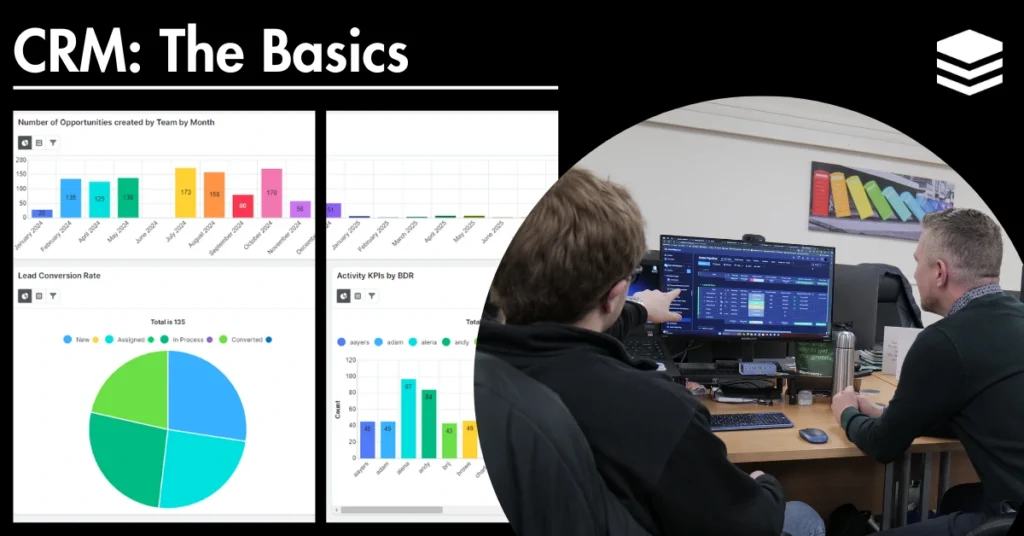Implementing a CRM system: The basics

The hardest part of your CRM journey should be choosing one, right? Well, not always. Just when you think your search for an effective and user-friendly platform is over, the long and gruelling implementation process begins.
Preparing to implement a new CRM system can feel overwhelming. Concerns about potential downtime, data transfer issues and whether the system will actually be used are common. Don’t worry, implementing a CRM system, from discovery all the through to support, is something we’ve mastered over the last twenty years. We’re here to share what you need to know.
Does implementing a CRM system affect your business?
There’s no doubt that introducing a brand new CRM system will have an effect on the business. However, these effects don’t have to be negative ones!
How long does it take to implement a CRM system?
The time it takes to implement a CRM system varies depending on your business needs and customisations required. Being transparent and working closely with your chosen partner throughout the discovery and development process, ensures both parties remain aligned meaning a quicker roll out of your new CRM system.
How much does it cost to implement a CRM system?
Considering the high up-front costs can make some people hesitate when deciding whether to proceed with a customer relationship management system. Much like the implementation timeframe, there is no standard cost – it varies in every case. However, not having a system to track, monitor, or actively engage with your customers often harms your business’s finances more than the investment in such a solution.
What does CRM integrate with?
Integrations play a crucial role in both the implementation and ongoing maintenance of a CRM system. With hundreds of available integrations including popular tools like QuickBooks, Outlook, and Mailchimp, CRM platforms are designed to streamline processes and provide a long-term, centralised solution. We talked about a few of the most powerful SugarCRM integrations in one of our previous blogs.
How do integrations work?
CRM integrations connect various applications with your CRM platform, acting as a bridge that enables real-time data to flow between them. For example, if you use an email marketing software to send content to customers, integrations can sync lists, track email opens, and capture clicks, which are then shared to your CRM to ensure complete transparency.
How can integrations benefit a CRM system?
Integrating two software programs can save a significant amount of time. For example, if you use Quickbooks to track your company’s finances, creating a new quote in your CRM system will instantly reflect in your Quickbooks account. Keeping everything up-to-date across both platforms eliminates the need for constant manual input across multiple systems.
CRM training
While integrations greatly enhance a CRM system, one of the most critical aspects of the implementation process is ensuring users are comfortable with the platform and know how to use it to its full potential.
Training comes in various forms and can be tailored to you and your team’s preferences. Ongoing support is the most valuable offering, providing you with an initial 360-degree understanding of the system coupled with dedicated, ongoing support.
Benefits of a CRM system
Although you’ll start seeing improvements immediately, the true advantages of CRM become clearer over time. The ability to generate reports, search the database, and automate tasks within the system helps strengthen your relationship with both leads and customers.
Customer retention
Keeping customers engaged with your brand is one of the hardest challenges in this day in age. With so many businesses often offering the same products and services, differentiation is a key factor to retaining customers. Personalisation is another strategy that can put you one step ahead of your competitors.
Personalising content
Making sure the content you’re sending customers is relevant can sometimes be challenging. Being able to specify who you are targeting by utilising assets such as report filtering and target lists, is crucial when segmenting your customers. By sending personalised content to the right customers, they’re more likely to be interested in the marketing you’re sharing.
Ongoing support
Speaking of personalisation, enable.services are a team of CRM specialists with over two decades of experience in discovering, building, implementing, and providing ongoing support with SugarCRM systems.

If your business requires a leading CRM solution, with unimaginable limits when it comes to customisability, book a discovery meeting with us today and speak to one of our experienced CRM consultants who will understand your exact needs.



